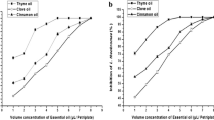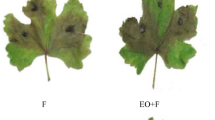Abstract
This study aimed to use thyme volatile oil (TVO) to control potato bacterial wilt disease caused by Ralstonia solanacearum and to explore the biochemical responses in relation to defense enzymes that induce resistance against pathogens in plants. In vitro experiments showed that all tested concentrations of TVO (1 µl, 2, 4, 6, 8, and 10 µl ml−1) significantly (P ≤ 0.05) inhibited the growth of the pathogen, with the most significant effect recorded at a concentration of 10 µl ml−1. Under greenhouse conditions, the tested concentration of TVO (10 µl ml−1) significantly (P ≤ 0.05) reduced the incidence of potato bacterial wilt and the population of R. solanacearum pathogens in potato plants. The current study also revealed that TVO (10 µl ml−1) increased the activity of antioxidant enzymes, e.g.,. peroxidase (POX) and phenylalanine ammonia-lyase (PAL), and reduced the activity of catalase (CAT) in treated potato plants. In conclusion, our results showed that TVO (10 µl ml−1) afforded a strong reduction of R. solanacearum radial growth in vitro and a high reduction in the development of potato wilt in vivo. Moreover, we demonstrated that POX and PAL activities can be used as biochemical markers for biocontrol efficacy in the control of potato bacterial wilt.




Similar content being viewed by others
References
Abd El-Sayed WM, Bayoumi RA, AbdEl-Ghafar NY (2003) Biological control of potato bacterial wilt disease under Egyptian conditions. Ann Agric Sci 4:353–364
Abo-Elyousr KAM, El-Hendawy HH (2008) Integration of Pseudomonas fluorescens and acibenzolar-S-methyl to control bacterial spot disease of tomato. Crop Prot 27:1118–1124. https://doi.org/10.1016/j.cropro.2008.01.011
Abo-Elyousr KAM, Ibrahim YE, Balabel NM (2012) Induction of disease defensive enzymes in response to treatment with acibenzolar-S-methyl (ASM) and Pseudomonas fluorescens Pf2 and inoculation with Ralstonia solanacearum race 3, biovar2 (phylotypeII). J Phytopathol 160:382–389. https://doi.org/10.1111/j.1439-0434.2012.01915.x
Abo-Elyousr KAM, Seleim MAA, Abd-El-Moneem KMH, Saead FA (2014) Integrated effect of Glomus mosseae and selected plant oils on control of tomato bacterial wilt. Crop Prot 66:67–71. https://doi.org/10.1016/j.cropro.2014.07.022
Aedi H (1984) Catalase in vitro. Meth Enzymol 105:121–126. https://doi.org/10.1016/S0076-6879(84)05016-3
Aguk JA, Karanja N, Schulte-Geldermann E, Bruns C, Kinyua Z, Parker M (2018) Control of bacterial wilt (Ralstonia solanacearum) in potato (Solanum tuberosum) using rhizobacteria and arbuscular mycorrhiza fungi. Afr J Food Agric Nutr Dev 18:13371–13387. https://doi.org/10.18697/ajfand.82.16905
Bagy HMMK, Abo-Elyousr KAM (2019) Antibacterial activity of some essential oils on bacterial spot disease of tomato plant caused by Xanthomonas axonopodis pv. vesicatoria. Int J Phytopathol 8:53–61. https://doi.org/10.33687/phytopath.008.02.2967
Balabel N (2020) Detection of Ralstonia solanacearum phylotype II, sequevar 1 in seasonal weed plants associated with potato cultivations in Egypt. J Phytopathol Pest Manag 7:64–78
Basim E, Basim H, Özcan M (2006) Antibacterial activities of Turkish pollen and propolis extracts against plant bacterial pathogens. J Food Eng 77:992–996. https://doi.org/10.1016/j.jfoodeng.2005.08.027
Bassolé IH, Lamien-Meda A, Bayala B, Tirogo S, Franz C, Novak J, Nebié RC, Dicko MH (2010) Composition and antimicrobial activities of Lippia multiflora Moldenke, Mentha x piperita L. and Ocimum basilicum L. essential oils and their major monoterpene alcohols alone and in combination. Molecules 15:7825–7839. https://doi.org/10.3390/molecules15117825
Bereika FFM, Sallam NMA, Alamri SAM, Abo-Elyousr KAM, Hashem M, Mostafa YS (2020) Approving the biocontrol strategy of potato wilt caused by Ralstonia solanacearum on field scale using Enterobacter cloacae PS14 and Trichoderma asperellum T34. Egypt J Biol Pest Control 30:61. https://doi.org/10.1186/s41938-020-00262-9
Bradford MA (1976) Rapid and sensitive method for the quantitation of Microgram quantities of protein utilizing the principle of protein dye binding. Anal Biochem 72:248–250. https://doi.org/10.1016/0003-2697(76)90527-3
Cavalcanti FR, Resendea MLV, Carvalhoc CPS, Silveirab JAG, Oliveira JTA (2006) An aqueous suspension of Crinipellis perniciosa mycelium activates tomato defence responses against Xanthomonas vesicatoria. Crop Prot 26:729–738. https://doi.org/10.1016/j.cropro.2006.06.012
Champoiseau PG, Jones JB, Momol TM, Pingsheng J, Allen C, Norman DJ, Caldwell K (2010) Ralstonia solanacearum Race 3 biovar 2 causing brown rot of potato, bacterial wilt of tomato and southern of granium. Department of Agriculture, USA, Agricultural Research Service, U.S
Deberdt P, Perrin B, Coranson-Beaudu R, Duyck PF, Wicker E (2012) Effect of Allium fistulosum extracts on Ralstonia solanacearum populations and tomato bacterial wilt. Plant Dis 96:687–692. https://doi.org/10.1094/PDIS-07-11-0601
Enas-Hassan A, ElHadidy AEA, Balabel NM, Eid NA, Ramadan EM (2018) Use of rhizobacteria as biocontrol agents against Ralstonia solanacearum: Principles, mechanisms of action and characterize its bioactive compounds. Curr Sci Int 7:242–256
FAOSTAT (2018) Available online: http://www.fao.org/faostat/en/#data/QC (accessed on 25 March 2020).
Gómez-Estaca J, López de Lacey A, López-Caballero ME, Gómez-Guillén MC, Montero P (2010) Biodegradable gelatin-chitosan films incorporated with essential oils as antimicrobial agents for fish preservation. Food Microbiol 27:889–896. https://doi.org/10.1016/j.fm.2010.05.012
Hamedo HA, Makhlouf AH (2016) Biological defense of some bacteria against tomato wilt disease caused by Ralstonia solanacearum. El-Minia Sci Bull 27:26–40
Hassan MAE, Abo-Elyousr KAM (2013) Activation of tomato plant defence responses against bacterial wilt caused by Ralstonia solanacearum using DL-3-aminobutyric acid (BABA). Eur J Plant Pathol 136:145–157. https://doi.org/10.1007/s10658-012-0149-4
Hayward AC (1991) Biology and epidemiology of bacterial wilt caused by Pseudomonas solanacearum. Annu Rev Phytopathol 29:65–87. https://doi.org/10.1146/annurev.py.29.090191.000433
He CY, Hsiang T, Wolyn DJ (2002) induction of systemic disease resistance and pathogen defence responses in Asparagus officinalis with nonpathogenic strains of Fusarium oxysporum. Plant Pathol 51:225–230. https://doi.org/10.1046/j.1365-3059.2002.00682.x
Hemm MR, Rider SD, Ogas J, Murry DJ, Chapple C (2004) Light induces phenylpropanoid metabolism in Arabidopsis roots. Plant J 38:765–778. https://doi.org/10.1111/j.1365-313X.2004.02089.x
Kaur R, Gupta AK (2014) Role of catalase, H2O2 and phenolics in resistance of pigeonpea towards Helicoverpa armigera (Hubner). Acta Physiol Plant 36:1513–1527. https://doi.org/10.1007/s11738-014-1528-6
Kelman A (1954) The relationship of pathogenicity in Pseudomonas solanacearum to colony appearance on a tetrazolium medium. Phytopathology 44:593–695
Kelman A, Winstead NN (1952) Inoculation techniques for evaluating resistance to Pseudomonas solanacearum. Phytopathology 42:628–634
Kempe J, Sequeira L (1983) Biological control of bacterial wilt of potatoes: Attempts to induce resistance by treating tubers with bacteria. Plant Dis 67:499–503. https://doi.org/10.1094/PD-67-499
Kurabachew H, Wydra K (2014) Induction of systemic resistance and defense-related enzymes after elicitation of resistance by rhizobacteria and silicon application against Ralstonia solanacearum in tomato (Solanum lycopersicum). Crop Prot 57:1–7. https://doi.org/10.1016/j.cropro.2013.10.021
Lemessa F, Zeller W (2007) screening rhizobacteria for biological control of Ralstonia solanacearum in Ethiopia. Biol Control 42:336–344. https://doi.org/10.1016/j.biocontrol.2007.05.014
Maji S, Chakrabartty PK (2014) Biocontrol of bacterial wilt of tomato caused by Ralstonia solanacearum by isolates of plant growth promoting rhizobacteria. Australian J Crop Sci 8:208–214
Najeeb S, Ahmad M, Khan RAA, Naz I, Ali A, Syed S, Alam, (2019) Management of bacterial wilt in tomato using dried powder of Withania coagulan (L) Dunal. Australasian Plant Pathol. 48:183–192. https://doi.org/10.1007/s13313-019-0618-8
Oussalah M, Caillet S, Saucier L, Lacroix M (2006) Antimicrobial effects of selected plants essential oils on the growth of a Pseudomonas putida strain isolated from meat. Meat Sci 73:236–244. https://doi.org/10.1016/j.meatsci.2005.11.019
Pradhanang PM, Ji P, Momol MT, Olson SM, Mayfield JL, Jones JB (2005) Application of Acibenzolar-s-Methyl Enhances host resistance in tomato against Ralstonia solanacearum. Plant Dis 89:989–993. https://doi.org/10.1094/PD-89-0989
Pradhanang PM, Momol MT, Olson SM, Jones JB (2003) Effects of plant essential oils on Ralstonia solanacearum population density and bacterial wilt incidence in tomato. Plant Dis 87:423–427. https://doi.org/10.1094/PDIS.2003.87.4.423
Putter J (1974) Peroxidase. In: Bergmeyer HU (ed) Methoden der enzymatischen Analyses. Verlag Chemie, Weinheim, p 725
Roberto B, Scarponi L, Ferrara M, Sidoti P, Bertona A (2002) Induction of systemic acquired resistance in pepper plants by acibenzolar-s-methyl against bacterial spot disease. Eur J Plant Pathol 108:41–49. https://doi.org/10.1023/A:1013984511233
Safdarpour F, Khodakaramain G (2018) Endophytic bacteria suppress bacterial wilt of tomato caused by Ralstonia solanacearum and activate defense-related metabolites. Biol J Microorganism 6:39–52
SAS Institute Inc (1996) SAS Institute Inc., SAS online Doc®, Version 8, Cary, NC, USA
Sholberg PL, Bedford KE, Haag P, Randall P (2001) Survey of Erwinia amylovora isolates from British Columbia for resistance to bactericides and virulence on apple. Can J Plant Pathol 23:60–67. https://doi.org/10.1080/07060660109506910
Silva HSA, Romeiro RD, Macagnan D, Vieira BDH, Pereira MCB, Mounteer A (2004) Rhizobacteria induction of systemic resistance in tomato plants: non-specific protection and increase in enzymes activities. Biol Control 29:288–295. https://doi.org/10.1016/S1049-9644(03)00163-4
Steinberg CEW (2012) Defense Means Against Pathogens and Parasites: Reactive Oxygen Species. In: Stress Ecology. Springer, Dordrecht. https://doi.org/10.1007/978-94-007-2072-5_3
Thangavelu R, Palaniswami A, Doraiswamy S, Velazhahan R (2003) The effect of pseudomonas fluorescens and Fusarium oxysporum f.sp. cubense on induction of defense enzymes and phenolies in banana. Biologia plantarum 46:107–112. https://doi.org/10.1023/A:1022374520121
Todorović B, Potočnik I, Rekanović E, Stepanović M, Kostić M, Ristić M, Milijašević-Marčić S (2016) Toxicity of twenty-two plant essential oils against pathogenic bacteria of vegetables and mushrooms. J Environ Sci Heal B 51:832–839. https://doi.org/10.1080/03601234.2016.1208462
Tsuda K, Tsuji G, Higashiyama M, Ogiyama H, Umemura K, Mitomi M, Kubo Y, Kosaka Y (2016) Biological control of bacterial soft rot in Chinese cabbage by Lactobacillus plantarum strain BY under field conditions. Biol Control 100:63–69. https://doi.org/10.1016/j.biocontrol.2016.05.010
Vanitha SC, Umesha S (2011) Pseudomonas fluorescens mediated systemic resistance in tomato is driven through an elevated synthesis of defense enzymes. Biologia Plantarum 55:317–322. https://doi.org/10.1007/s10535-011-0045-3
Yuliar, Nion YA, Toyota K (2015) Recent trends in control methods for bacterial wilt diseases caused by Ralstonia solanacearum. Microbes Environ 30:1–11. https://doi.org/10.1264/jsme2.ME14144
Acknowledgements
Authors are thankful to Taif University Researchers Supporting Project number (TURSP-2020/65), Taif University, Taif, Saudi Arabia for providing the financial support and research facilities.
Author information
Authors and Affiliations
Contributions
Kamal Abo-Elyousr, and Esmat F. Ali suggested the idea of the work and contributed to data curation and their validation as well as writing original draft. Nashwa Sallam, Mohame Breakia and Mohamed Seleim contributed to the formal analysis of the data all authors contributed to the reviewing and editing the manuscript. All authors reviewed and approved the final version of the manuscript.
Corresponding author
Ethics declarations
Ethics approval
Our manuscript is original research and it is not submitted to full or in parts to other journal for publication.
Informed consent
All authors have reviewed the manuscript and approved the final version of manuscript before submission.
Conflict of interest
The authors declare that they do not have any actual or potential conflict of interest.
Human and animal studies
The research did not involve any studies with human participants or animal as experimental model.
Additional information
Publisher's Note
Springer Nature remains neutral with regard to jurisdictional claims in published maps and institutional affiliations.
Rights and permissions
About this article
Cite this article
Sallam, N.M.A., Ali, E.F., Abo-Elyousr, K.A.M. et al. Thyme oil treatment controls bacterial wilt disease symptoms by inducing antioxidant enzyme activity in Solanum tuberosum. J Plant Pathol 103, 563–572 (2021). https://doi.org/10.1007/s42161-021-00808-2
Received:
Accepted:
Published:
Issue Date:
DOI: https://doi.org/10.1007/s42161-021-00808-2




